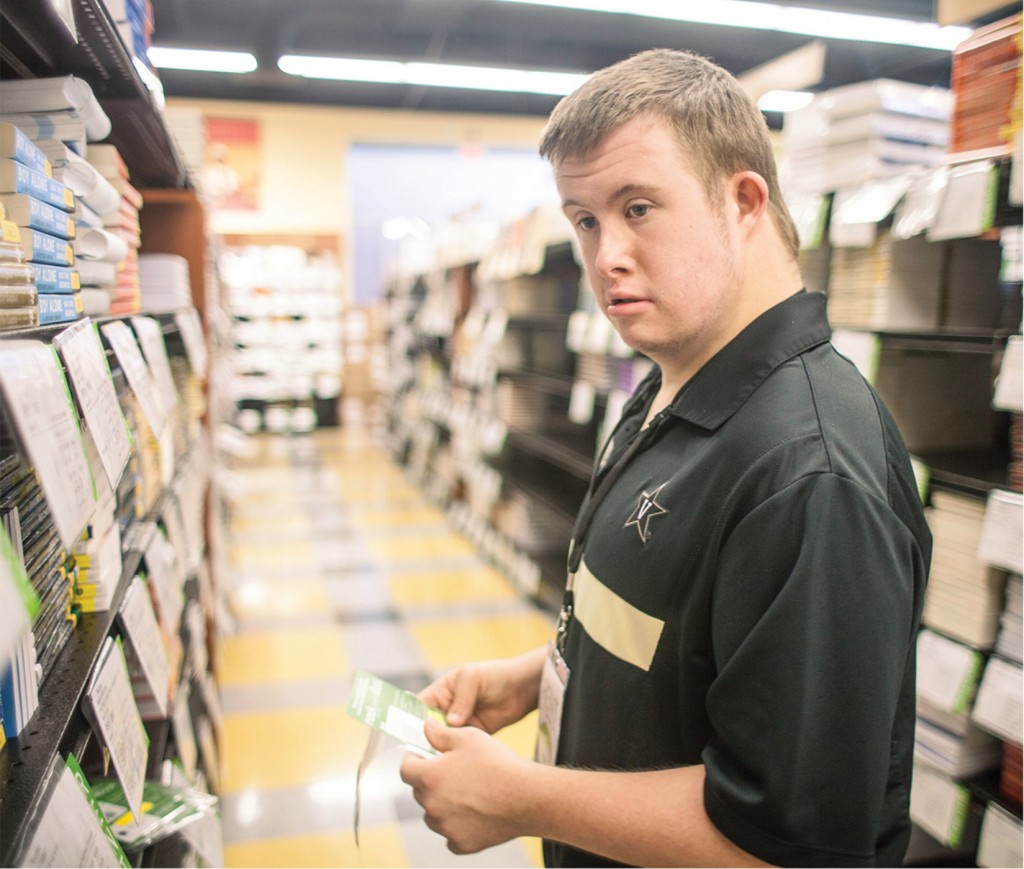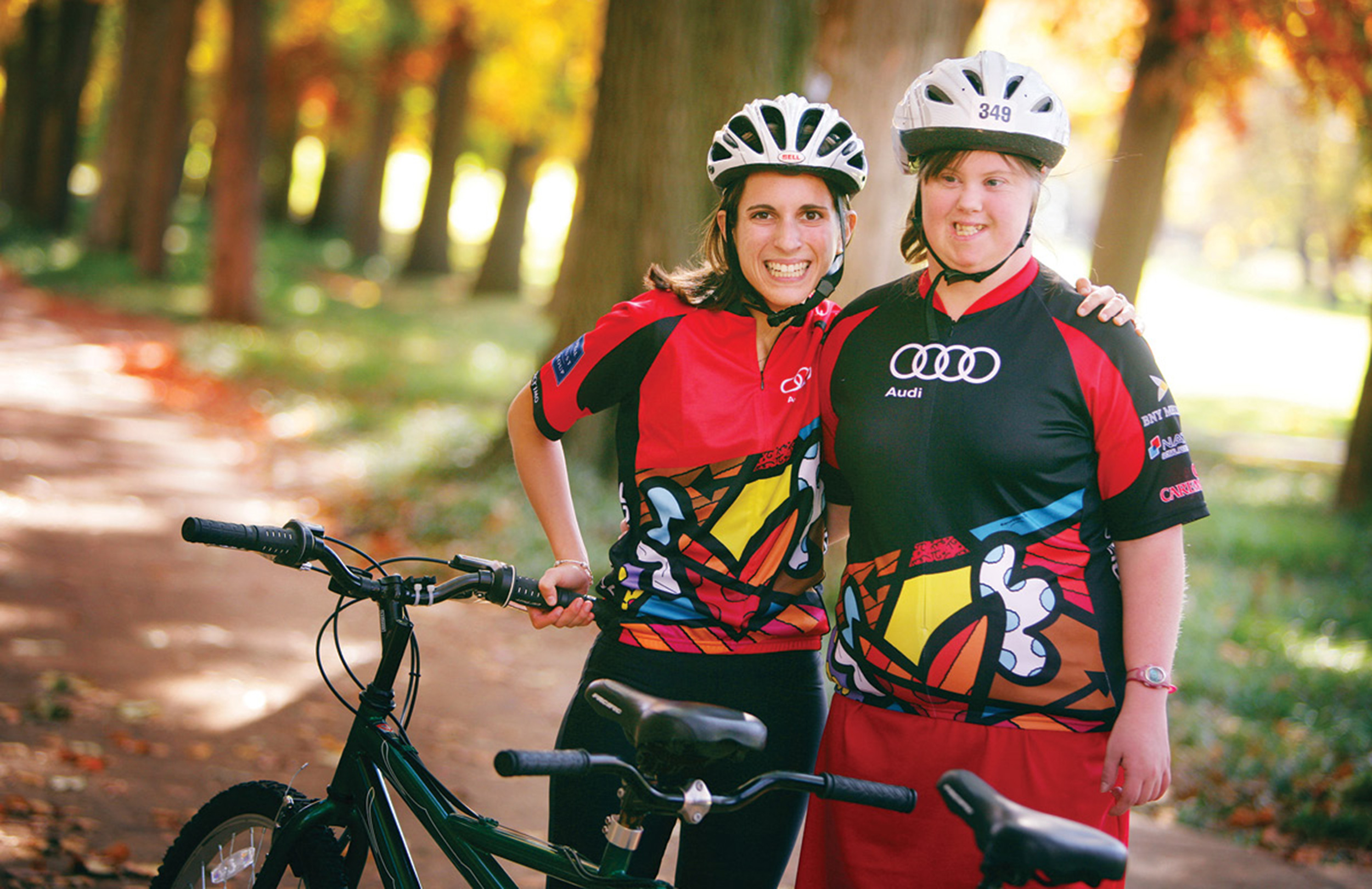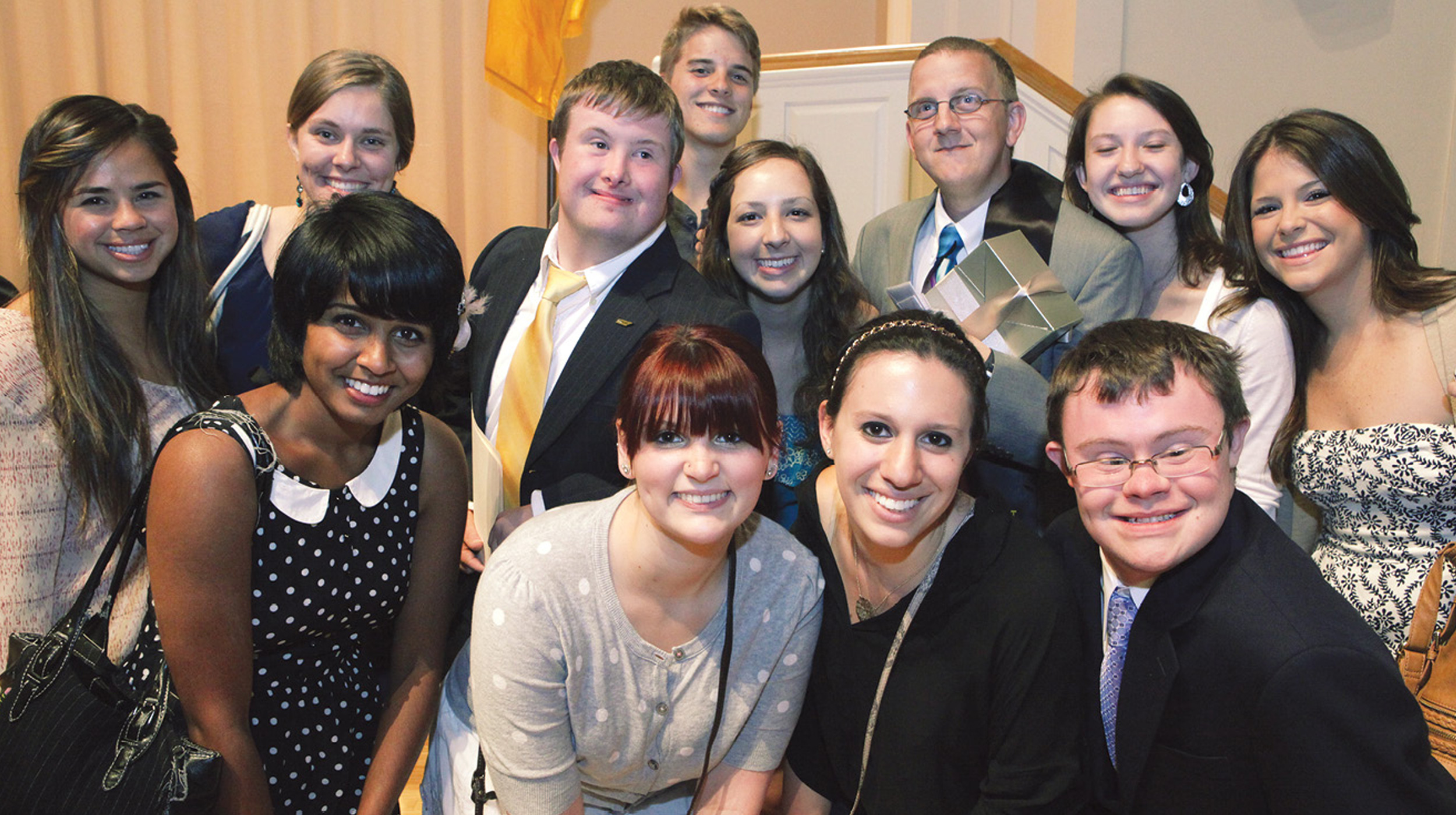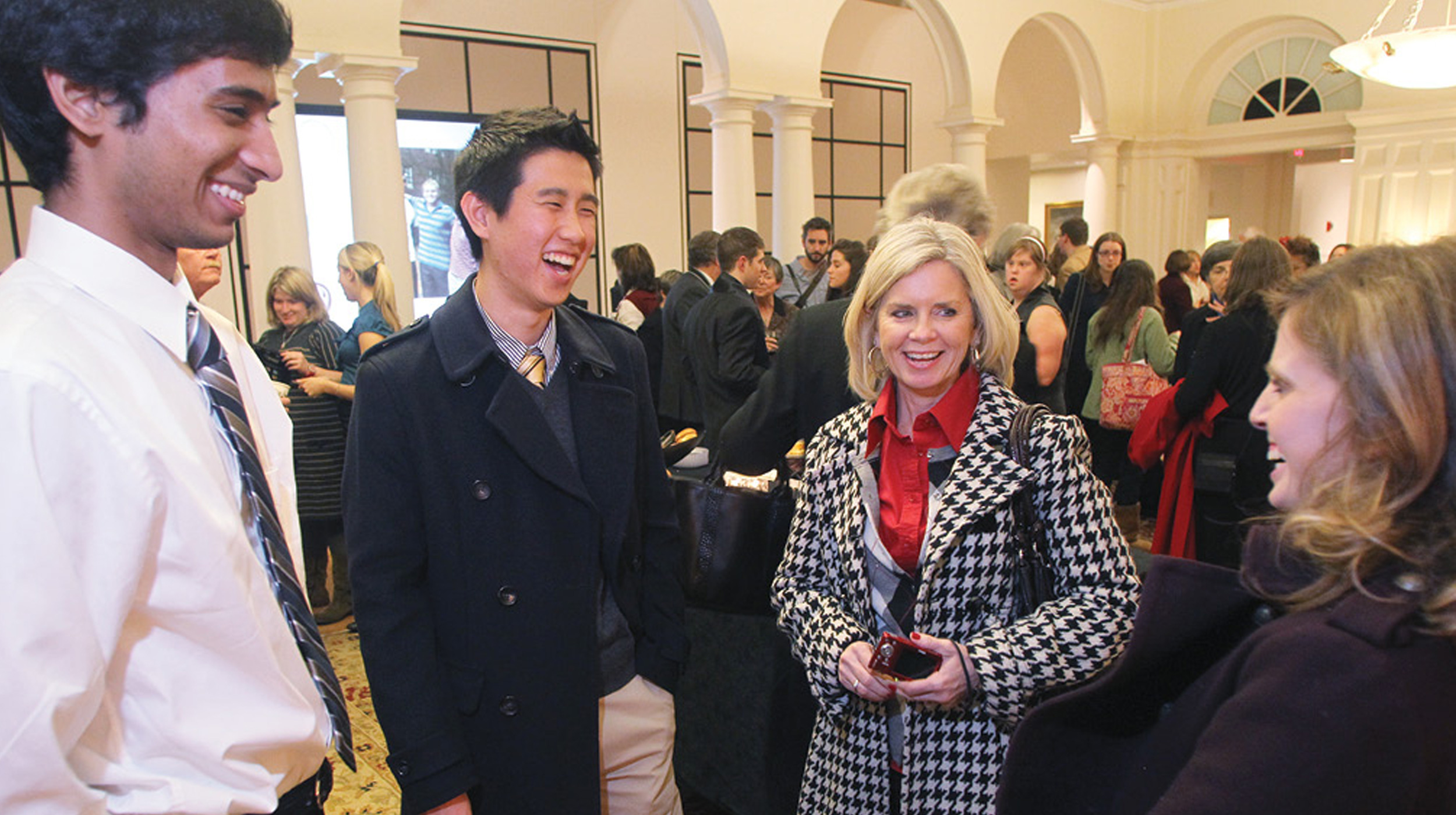By Jennifer Johnston
Although Crystal Finley, BS’13, entered Vanderbilt with a clear plan for success, her life mission would soon change when she became a volunteer mentor with Next Steps at Vanderbilt, a postsecondary program for students with intellectual or other disabilities.
As a freshman at Vanderbilt four years ago, she joined Ambassadores, a “circle of support” for the Next Steps program, which had just accepted its inaugural class. Ambassadores such as Finley help students with homework, organization, scheduling and tutoring. Sometimes they just hang out together—grabbing a bite to eat, taking in basketball games, or shooting pool on The Martha Rivers Ingram Commons.
“I had never interacted with people with disabilities before I volunteered with Ambassadores,” Finley says. “In doing so, I soon realized it was much more where I was supposed to be and who I was supposed to be.”
After experiencing her first-ever academic failure in the engineering discipline she had thought would be her path to success, Finley decided during her sophomore year to change her major to special education. Having graduated this year with her bachelor’s degree, she’s now working toward her master’s degree in special education at Peabody College.
“You’re supposed to change and grow in college and realize where you’re supposed to be. Engineering was not a good fit for me, and I had to figure that out,” she says.
Matt Moore, a Next Steps student in her circle of support, was having a similarly transformative experience. “Next Steps changed my life,” says Moore, 23, who graduated from the nonresidential program in 2013 and recently transitioned to a job at Best Buy.
“In Next Steps I learned things. I met new people. I did a lot of internships and tried different jobs,” he says. His favorite—with his friend and fellow Next Steps participant Will McMillan—involved managing and cleaning football team equipment.
Next Steps launched in 2009, and its first class of six students graduated in December 2011. As part of the two-year certificate program, each semester Next Steps students enroll in one regular Vanderbilt course related to their career interests. They take additional classes to prepare for employment and community living.
Moore’s ease at mastering the intricacies of college life impressed his family. “He felt so much a part of campus life,” says his mother, Sheila Moore. “He became self-confident, much more independent and opinionated. He very appropriately lets us know what he likes and that he can make his own decisions—something he didn’t do before.”
[featurefullquote]Enjoy being on campus and learning how to be independent. Focus on one goal at a time. Each time you step forward with a goal, you’re overcoming a challenge.[/featurefullquote]
JOY, PASSION AND ZEST FOR LEARNING
The impact of Next Steps at Vanderbilt clearly goes far beyond the up to 16 students enrolled. The students’ joy, passion and zest for learning have inspired their classmates and contributed to a more inclusive climate, says Sharon Shields, professor in the practice of human and organizational development and associate dean for professional education at Peabody.
“It’s been transformational,” says Shields. “This has added new life to the campus and new life for the students involved. And isn’t that what a true living–learning laboratory is all about?”
In her course Health Service Delivery to a Diverse Population, Shields says traditional students “saw me live out the course work in an inclusive, respectful way with the Next Steps student enrolled in the class. It’s one thing to talk about dealing with a diverse population and another thing to embrace it.”
Shields says the candor of Next Steps students is refreshing. She recalls a classroom exchange that took place after a guest speaker described losing custody of her children because of her addiction issues. Jeanne Gavigan, a Next Steps student whose mother had died, raised her hand and addressed the speaker.
“Jeanne said, ‘I just want you to know that my mother died three years ago, and there is never a day that I don’t think about my mother and feel her guiding me. I want you to know your children will never forget you,’” Shields remembers. “There was not a dry eye in the room. It was a human experience at one of the deepest levels.

“These students really open up a classroom to honest sharing, and they inspire their classmates to work harder.”
As faculty head of Murray House on The Martha Rivers Ingram Commons, Shields initiated a Susan Gray–Murray House Fellowship that pairs volunteer first-year Vanderbilt students with children enrolled in the Vanderbilt Kennedy Center’s Susan Gray School, a nationally recognized early childhood education and early intervention program.
One of those volunteers was Ryan McKenney, now a junior majoring in political science and history with a minor in economics. Through his living–learning experience on The Commons, his eyes were opened to a world of service opportunities.
The Susan Gray experience led him to volunteer as an Ambassadore with Next Steps, allowing him to experience the full spectrum of challenges for individuals with disabilities, from preschool through college. He became deeply interested in the next tier of challenges for Next Steps graduates and plans to spend part of his junior year researching, under Shield’s guidance, possible solutions to mobility issues facing adults with intellectual disabilities.
Next Steps students “have spent 22 years or more overcoming speech, mental and physical problems and earning a college certificate,” says McKenney, an Ingram Scholar who grew up in Memphis, Tenn. “So you hate to strip them of any independence they’ve worked so hard for by not getting them to the job they’ve earned.”
He has been inspired by Next Steps students’ work ethic, kindness of heart and indomitable spirit. “What if everyone had that unbelievable joy and passion for what they are studying?”

Jessi Solomon, left, and Jeanne Gavigan, a 2011 Next Steps graduate, rode a tandem bike to complete the 20-mile 12th Annual Audi Best Buddies Challenge in Hyannis Port, Mass. “We flew down the hills of Cape Cod singing songs from Aladdin at the top of our lungs because [Jeanne] loves Disney movies,” says Solomon, BS’10, who is now in her final year of medical school at Vanderbilt. “We are so much alike; Jeanne is so enthusiastic and acts the way I want to act all the time.” (photo by Daniel Dubois)
LEARNING WITHOUT FILTERS
Next Steps students take a variety of classes on campus—from astronomy to oceanography to presidential politics—and they generally are not afraid to ask questions or show they don’t understand concepts. That attitude has been instructive to their classmates, says Cynthia Cyrus, professor of musicology and associate provost for undergraduate education.
“Traditional Vanderbilt students won’t let themselves be seen as naïve. Next Steps students will let themselves be seen as who they are,” she says.
McKenney agrees. “To have classmates without that filter is refreshing—it helps us admit there is always going to be hard stuff we don’t understand.”
Faculty members have discovered that Next Steps students significantly broaden the classroom experience for everyone, in part by tapping into “that part of you that learns best when you’re teaching concepts to others,” Cyrus says.
Next Steps students register for classes as an independent study with a syllabus and expectations adapted to their abilities. They are provided a support system that includes note-taking and tailored materials, and they take additional classes that foster their path to job placement and independent living, which they practice in an apartment at the Village at Vanderbilt.
College isn’t for everyone, says Elise McMillan, Vanderbilt Kennedy Center co-director and director of community outreach—but having the opportunity is important. “What we know is that spending just one semester in college increases one’s earning power as an employee,” she says.
While the K–12 environment has become much more inclusive, “there’s a cliff for individuals with disabilities at the postsecondary level,” McMillan says. Just like traditional students, children and young adults with intellectual disabilities long to go to college with their peers.
That longing was particularly poignant for Elise’s son, Will McMillan.
“From the time Will was about 10 years old, we had a wonderful dream that our son would go to college like his brother and sister,” she says. Along with other parents of children with Down syndrome and various other intellectual disabilities who shared that dream, McMillan attended national meetings where postsecondary education for individuals with disabilities was a hot topic.
“We came back to Nashville after a meeting, turned our dreaming into a very small planning group, and then asked ourselves what it would take to bring this concept to Tennessee,” she says. That planning group began working with Think College, a Boston clearinghouse for such programs that provides technical and other support. Next Steps became the first program of its kind in Tennessee and is now one of three.
Tammy Day was looking for her next opportunity to work with individuals with intellectual disabilities when she was tapped as Next Steps program director in 2009. A Vanderbilt graduate who received her master’s degree in special education in 2000, she had nine months to get Next Steps in place, which included 220 meetings and steady, enthusiastic support from Vanderbilt administration.
Will McMillan was 23 years old when he enrolled as an early Next Steps participant.
“I saw his love for learning expand” after beginning the program, says Elise McMillan. “The range of classes he took was very different—from history to military science to intro to films. He thoroughly enjoyed all of them, and that’s not something he would have had the opportunity to do before this program was in place.”
Will especially enjoyed his Vanderbilt classes in American history and politics, which increased his understanding of government and spurred his social conscience, especially around problems of job layoffs and homelessness, he says.
As a Next Steps student, Will worked in two different campus libraries and wrote a column for The Vanderbilt Hustler called “The Loop,” in addition to helping out as a football equipment handler.
A ubiquitous presence at Vanderbilt sporting events, the younger McMillan is proud of having attended his dad’s alma mater—his father is Tom McMillan, BE’85, EMBA’90. Will, now 25, holds two jobs: one at the Barnes & Noble Vanderbilt bookstore and one at the YMCA in Nashville’s Green Hills neighborhood.
At the YMCA, Will sometimes mentors younger people with intellectual disabilities. He advises high school students with intellectual disabilities who are considering a postsecondary experience to “take it slow.”
“Get to know people,” he says. “Enjoy being on campus and learning how to be independent. Focus on one goal at a time. Each time you step forward with a goal, you’re overcoming a challenge.”

Next Step graduates, Vanderbilt Ambassadores and well-wishers gather at the April 2012 commencement ceremony. (photo by Anne Rayner)
“I’VE CHANGED A WHOLE LOT. I’M NOT SCARED.”
Michael Heroux, a 2011 Next Steps program graduate, initially wasn’t sure if college was for him. “Now I know I made the right choice,” he says. The best part of the experience for him, he says, was taking interesting classes in a small-group setting. He loved anything to do with politics and history, inspiration that came from his late father.
“I’ve changed a whole lot,” says Heroux. “I’m not scared. I can talk to people. I’m living on my own right now. That was my goal, and I’ve got a good job.” He’s currently employed by Goodwill Industries and has earned further independence by obtaining a driver’s license.
His friend and Ambassadore was Ajan Sivaramamoorthy, BA’13, who majored in chemistry and made a one-year Americorps commitment following graduation, in part because of his service experience as a Vanderbilt student.
Sivaramamoorthy says he loved the simplicity of being an Ambassadore. “You’re grabbing lunch, exercising together, making new friends, and it’s serving a good purpose.”
But he admits to being nervous about the prospect at first. “Something I didn’t expect was that we would have a lot of the same interests, such as playing basketball. I didn’t realize I would become such good friends with all of them,” he says.
Heroux needed little help with assignments—sometimes just a few hints about technical issues on the computer. “Once he had a sense of what he had to do, he could do it,” says Heroux’s mentor.
In the end, Next Steps students want to be seen as capable and independent just like their peers, says 2011 graduate Edward Nesbitt, 27. “In a mirror I don’t see myself as anyone different,” he says. “I want to be treated the same as everyone else. Support me, but not too much. In the end my future is what I make of it.”
Next Steps doesn’t abandon graduates like these once the program ends. Twenty hours of on-site job training help them make the transition to the working world. Kyle Jonas, who is pursuing a master’s degree in theological studies from Vanderbilt Divinity School, accompanies the students to internship and job sites to offer personalized support in performing difficult tasks.
Jonas stumbled into working with Next Steps as a work/study student during his first year in the divinity school. “I had very limited experience with people with disabilities,” he says. “I came in as an outsider, not knowing the culture, the correct language to use, or how to interact with them.”
As a job coach and videographer, he was impressed by the degree to which Next Steps participants felt happy, fulfilled and fully integrated. Walking around campus with McMillan and other students made Jonas feel he was in the company of celebrities. “The football players would come up and high-five him,” he says.
Next Steps has changed a lot of lives at Vanderbilt, says Jonas, including his own. “I think the program is important because it’s working to remove the wall that divides people with and without disabilities. And that’s important because this kind of integrated life is necessary for us to live in harmony with each other.”
He pauses and laughs. “I know that’s a divinity school answer, but that’s what I think.”
[featurefullquote]In a mirror I don’t see myself as anyone different. I want to be treated the same as everyone else. Support me, but not too much. In the end my future is what I make of it.[/featurefullquote]
What’s the next step for Next Steps? In addition to generous support from the university, strong Vanderbilt Kennedy Center supporters have shared in the vision for postsecondary opportunities for students with intellectual and developmental disabilities and their families, says Elise McMillan.
Linda Brooks and her family and the LDB Foundation provided the initial gift that led to the creation of Next Steps at Vanderbilt, McMillan says. The Tennessee Council on Developmental Disabilities and its executive director, Wanda Willis, provided an initial three-year grant to help establish the program. Carol Henderson, BA’53, and her family, who already support the Vanderbilt Kennedy Center through the endowed Britt Henderson Training Series, have provided a multiyear gift to support Next Steps.
“These and many others have helped financially and with resources, but we must raise additional funding for this to be a sustained long-term program here,” McMillan says. “That’s our challenge for the future.”
Meanwhile, across the university, faculty, students and staff are surprised by the impact of their interactions with Next Steps students. “Many of them say, ‘I am a better person because of my interactions with these students,’” says Tammy Day.
While Next Steps students have received wonderful support from the university community, Day says she has been touched by their desire to help others. Moore and other Next Steps students organized a toiletry drive to help the homeless, and Will McMillan asked if he could channel his early experiences into a talk to middle-school students about bullying.
“We have had incredible support from this university,” Day says. “It’s become far grander than I ever could have imagined it would. I’m happy that I can say now: We belong here. Vanderbilt claims us.”
Crystal Finley, who threw out her plans to major in engineering after her experience as an Ambassadore, remains “grateful and humbled” by the changes in her life that resulted from volunteering with Next Steps. She spent the summer after graduation working as a personal care assistant in a reading clinic at the Kennedy Center before entering grad school at Vanderbilt this fall.
She was invited to address Next Steps students as their 2013 graduation speaker, telling them how much they had inspired her. “I found that success was being the person I wanted to be—and living it with joy.”

Next Step graduates, Vanderbilt Ambassadores and well-wishers gather at the December 2011 commencement ceremony. (photo by Steve Green)
A former senior public affairs officer at Vanderbilt, Jennifer Johnston is a Nashville writer.